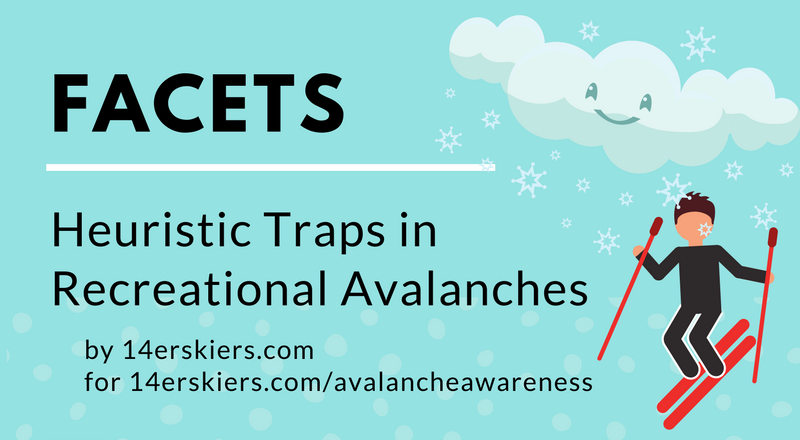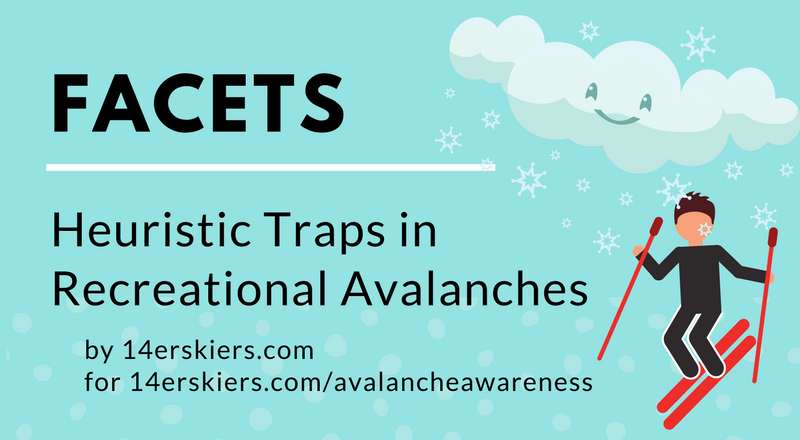Avalanche Awareness
(Last Updated On: )
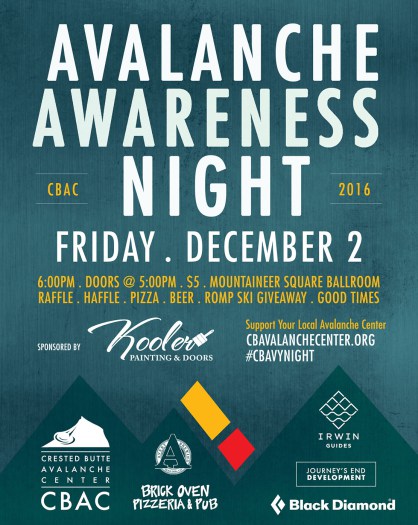 Last week, I attended Crested Butte’s Avalanche Awareness night and I was reminded of how lucky we are as a community to have this amazing organization right in our very own valley. So often, avalanche awareness programs are wrought with the simple stuff that you’ve heard a million times over – “Slopes between 35 and 45 degrees are most prone to sliding,” “These are some of the types of avalanches”, etc. While this is always good information and something to reminded of, it’s also good to hear the other stuff – the stuff that really makes your brain think.
Last week, I attended Crested Butte’s Avalanche Awareness night and I was reminded of how lucky we are as a community to have this amazing organization right in our very own valley. So often, avalanche awareness programs are wrought with the simple stuff that you’ve heard a million times over – “Slopes between 35 and 45 degrees are most prone to sliding,” “These are some of the types of avalanches”, etc. While this is always good information and something to reminded of, it’s also good to hear the other stuff – the stuff that really makes your brain think.
So, when Zach Guy began the very first presentation of the evening with the thought-provoking topic of heuristic traps, I knew this night was going to be different. Zach covered the six heuristic traps that are most common, remembered through the acronym “FACETS”, originally conceived by Ian McCammon.
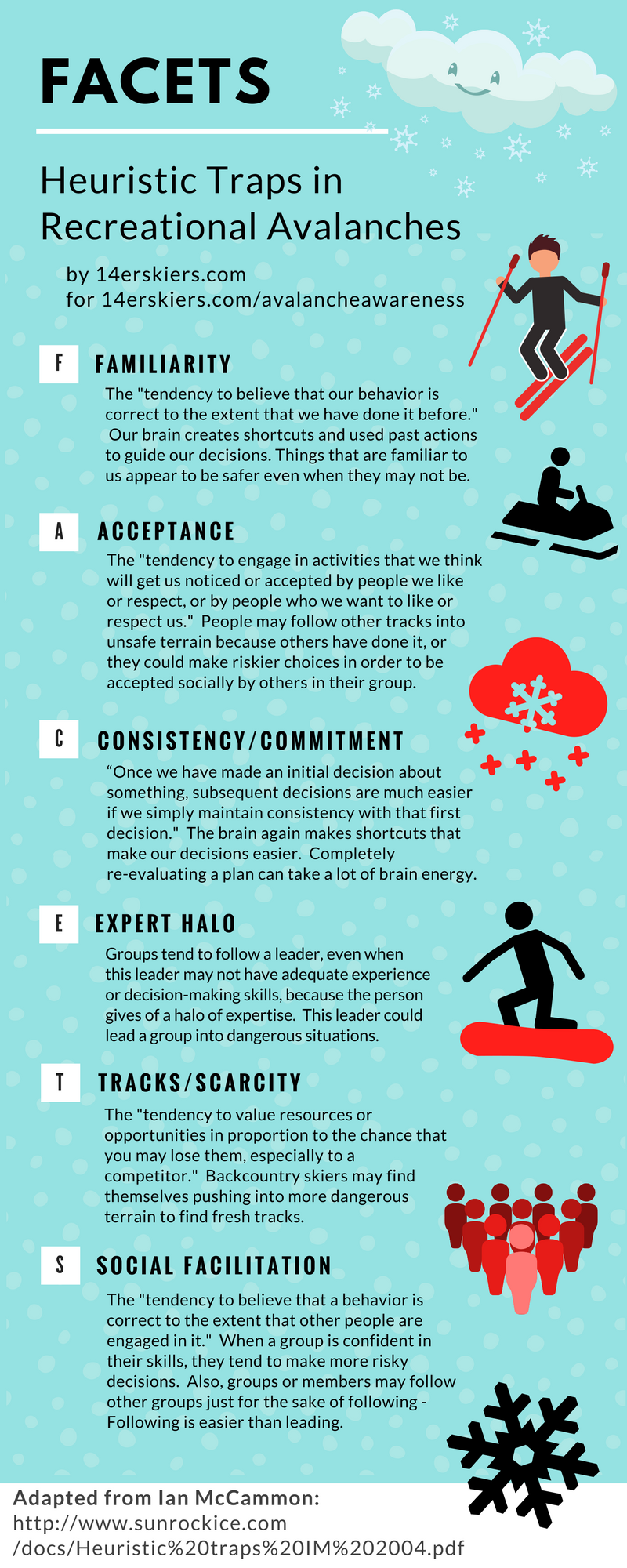
While heuristic traps were not something that was new to me, it’s something that I think every backcountry skier needs to know about, and be very aware of when making decisions in the backcountry. Frank and I have both admittedly fallen prey to these at times, and any backcountry skier who denies that they haven’t would be a liar. However, you can minimize their impacts, and being aware of HOW you think and make decisions (metacognition) can help reduce heuristic traps. In my mind, it’s a topic we can’t talk enough about, because these heuristic traps are always there and the brain works in ways that keep making them happen.
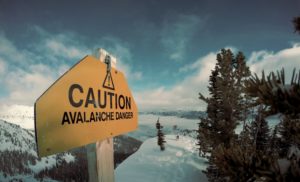 Zach talked a little bit about how the brain works – that we are constantly trying to find shortcuts in our decision-making because the brain is lazy. We need to fight that laziness and really question our decision making every step of the way. And this is something we constantly need to be reminded about because, essentially, we are battling our own brain.
Zach talked a little bit about how the brain works – that we are constantly trying to find shortcuts in our decision-making because the brain is lazy. We need to fight that laziness and really question our decision making every step of the way. And this is something we constantly need to be reminded about because, essentially, we are battling our own brain.
But, I am not an avalanche professional. My goal is not necessarily to teach you about heuristic traps other than to bring your attention to them. I encourage you to take a look at these documents below, and also to listen to the new podcast Slide. You can never know enough about heuristic traps.
- Addressing Human Factors in Avalanche Accidents
- Heuristic Traps in Recreational Avalanches
- Evidence of heuristic traps in recreational avalanche accidents
- When Judgment Fails
The second presentation of the night was by Elizabeth Lamphere whose husband, Ian Lamphere, perished in the Sheep Creek avalanche on Loveland Pass in 2013 along with four others. It was a terrible tragedy and Elizabeth spoke about it with brave honesty. To hear her perspective about how she found out about the passing of her own husband, and how she came to realize that she would have to raise their 8 month daughter on her own brought tears to my eyes. It brought home the realization that avalanches don’t just impact you and your life, they impact the ones you love and beyond – something you may already be familiar with if you’ve lost someone to the backcountry.
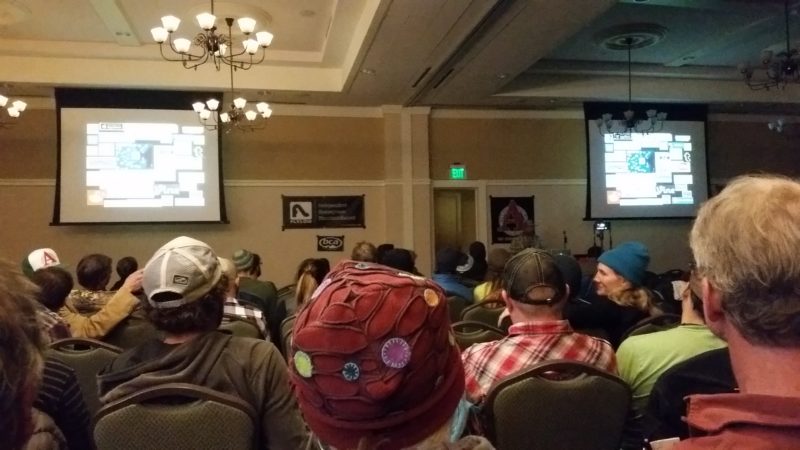
The third presentation of the night was made by Billy Rankin about the “Role of Public in Public Safety.” Again, harping on the fact that our decisions are not our own – they impact your partners, other people in the backcountry, loved ones, and even potential rescuers. For example, what if the four people buried in the avalanche on Cherry Bowl didn’t have another group to come rescue them? What if that group had refused due to safety concerns? What if those rescuers had been in danger too? Basically, it’s in everyone’s best interest to think safety first and to lead by example. Being a good role model in the backcountry is important.

For more information on how social media can impact our decision-making in the backcountry, check out these articles:
- How Social Media Can Lead to Avalanche Accidents
- Avalanche educators grapple with social media’s influence on backcountry travelers’ decision making
- Mountain Skills – Social Media vs Snow Safety
The three presentations at the CBAC’s Avalanche Awareness night were all excellent and I feel honored that we have such a great resource in our community. Each one got by brain working, thinking about how we make decisions in the backcountry and how that can be improved. Even though I won’t be skiing this year due to my injury, I can still learn during my time off, and analyze the decisions I’ve made in the past. Thank you to CBAC for getting my brain churning and for being dedicated to keeping this community safe.
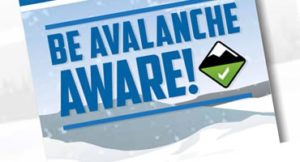 I encourage you to improve your avalanche skills by challenging the decisions you make in the backcountry on a regular basis, furthering your avalanche education by taking more courses or reading more avalanche-related material (check out our Snow Safety Sundays), and remain dedicated to making safe decisions in the backcountry, not only for you, but for the sake of those who surround you. While you’re at it, donate to the Crested Butte Avalanche Information Center or the Colorado Avalanche Information Center. The frequent forecasts and the educational material within them is unparalleled. We are so lucky to have these valuable resources in our state!
I encourage you to improve your avalanche skills by challenging the decisions you make in the backcountry on a regular basis, furthering your avalanche education by taking more courses or reading more avalanche-related material (check out our Snow Safety Sundays), and remain dedicated to making safe decisions in the backcountry, not only for you, but for the sake of those who surround you. While you’re at it, donate to the Crested Butte Avalanche Information Center or the Colorado Avalanche Information Center. The frequent forecasts and the educational material within them is unparalleled. We are so lucky to have these valuable resources in our state!
- Mount Buckskin (17 May 2020) - May 28, 2020
- Horseshoe Ski (14 May 2020) – The mountain whose journey nearly killed me - May 27, 2020
- Sayres X-Rated Ski (10 May 2020) - May 19, 2020
